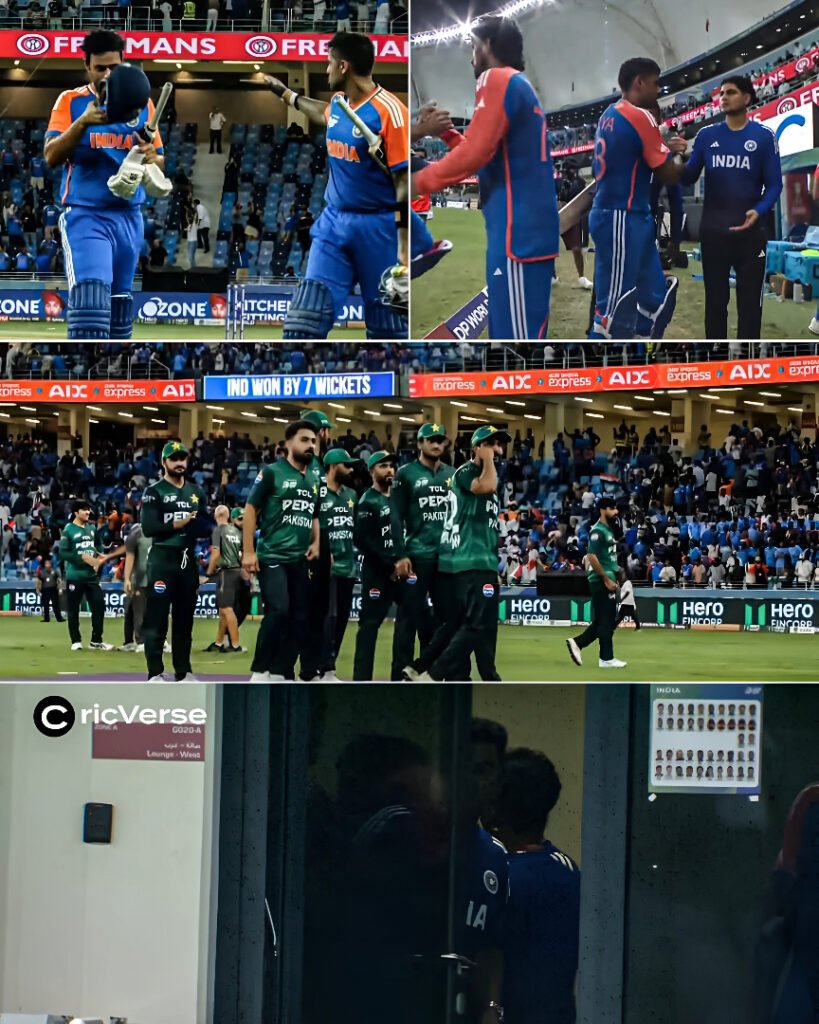Table of Contents
Introduction
In a stunning revelation following India’s victory over Pakistan, it has emerged that the Indian team’s decision to forgo the traditional post-match handshakes was not a spontaneous act by the captain but a calculated directive from the highest levels of the BCCI and the Indian government. This deliberate move was a powerful act of protest against the Pahalgam terror attack, signaling a new, hardened stance in India-Pakistan cricket relations where national sentiment has been placed firmly above sporting traditions.
Key Takeaways: The “No Handshake” Directive
- The Decision: The call to not shake hands with the Pakistani players came from the “upper echelons of power” within the BCCI and the Indian government.
- The Reason: It was a deliberate act of protest and solidarity with the victims of the Pahalgam terror attack on April 22.
- Captain’s Stance: Captain Suryakumar Yadav confirmed the collective decision, stating, “Some things in life are more important than the spirit of sportsmanship.”
- The Message: The move indicates that India is “no longer fussed about friendships” with Pakistani opponents in the shadow of terrorism.

“A Decision from Above”
While the on-field action saw India secure a comfortable victory, the most talked-about moment came after the final ball was bowled. The Indian players were seen celebrating but pointedly avoided the customary handshake line with the Pakistani team, a gesture that immediately sparked intense debate.
No handshake by Indian team.
Pakistan waited for handshake but India went to the dressing room and closed the doors.
What a humiliation by Indian team 🤣
Belt treatment for Porkis#INDvPAK #IndianCricket #INDvsPAK #indvspak2025 #AsiaCupT20 #AsiaCup #ShubmanGill #ViratKohli𓃵 pic.twitter.com/zXMXZEmiuP
— Aman (@dharma_watch) September 14, 2025
Sources have now confirmed that this was not an on-the-spot decision made by Captain Suryakumar Yadav. Instead, it was a pre-meditated policy directive handed down by the Board of Control for Cricket in India (BCCI) and the Indian government. The aim was to use the massive platform of an India vs Pakistan match to send a strong political message.
A Protest for Pahalgam
The core reason behind the no handshake policy was to register a protest against the tragic terror attack in Pahalgam, Jammu & Kashmir, on April 22, which resulted in the death of 26 innocent people. By refraining from the friendly gesture of a handshake, the Indian establishment intended to convey a clear message: routine sporting camaraderie cannot continue as normal while the nation mourns victims of terror.
When questioned about it in the post-match press conference, Suryakumar Yadav handled the sensitive issue with maturity. He did not shy away from the reasoning, confirming it was a conscious decision.
“Some things in life are more important than the spirit of sportsmanship,” Yadav stated, before reiterating his dedication of the win to the armed forces and the families of the Pahalgam victims.
A New Era in a Historic Rivalry
Post match stance : “The call we took our govt and BCCI were aligned” pic.twitter.com/okZysLahWL
— Lala (@FabulasGuy) September 14, 2025
This incident marks a significant shift in the India-Pakistan cricketing rivalry. For years, the mantra has been to “keep politics out of sport.” However, this calculated move shows a new policy where the “moral code,” as one report put it, is now being dictated from well above the players’ pay grade. It signals that going forward, off-field political realities will have a direct and visible impact on on-field conduct.
Conclusion
The no handshake policy after the India-Pakistan match has transformed a sporting victory into a powerful political statement. While the move has been praised by some for its patriotic stance, it has also sparked a debate on the role of sportsmanship in a deeply fractured relationship. What is clear is that the decision was a deliberate and top-down directive, marking a new and more confrontational chapter in the storied history of India-Pakistan cricket.
For any questions or feedback, feel free to reach out via our Contact Page.
Sources:
- BCCI (Board of Control for Cricket in India): For official team news.
- Press Trust of India (PTI): For reports on the Pahalgam terror attack.
Frequently Asked Questions (FAQ)
Why didn’t the Indian team shake hands with the Pakistani team?
It was a deliberate act of protest against the Pahalgam terror attack. The decision was a top-down directive from the BCCI and the Indian government.
Was this Suryakumar Yadav’s decision?
No, the Indian captain confirmed that it was a collective decision influenced by the BCCI and the government, stating that some things are more important than sportsmanship.
What was the Pahalgam terror attack?
It was a terrorist attack that took place on April 22 in Pahalgam, Jammu & Kashmir, which resulted in the death of 26 people.
Does this mean India will not play against Pakistan in the future?
The article does not suggest that. It only refers to the post-match gesture of a handshake. The teams are scheduled to play in multi-national tournaments like the Asia Cup and World Cup.